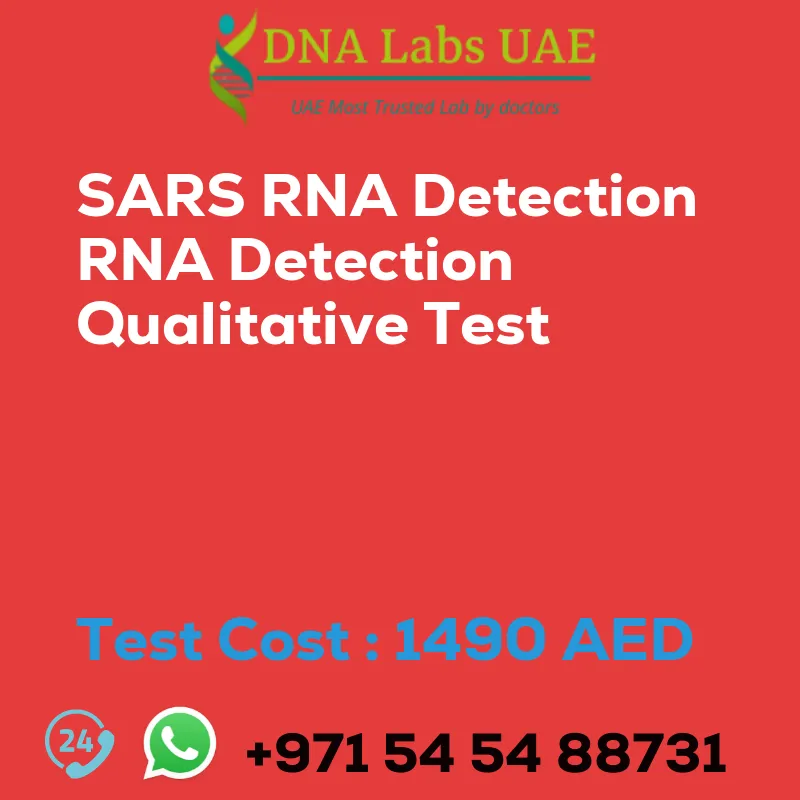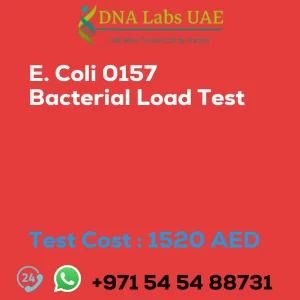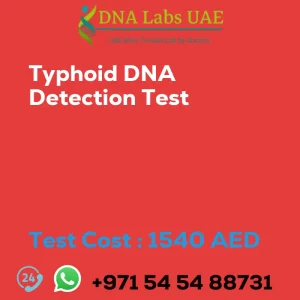SARS RNA Detection Qualitative Test
At DNA Labs UAE, we offer the SARS RNA detection qualitative test to detect the presence of the RNA (genetic material) of the severe acute respiratory syndrome (SARS) virus in a patient’s sample. This test is performed using the real-time polymerase chain reaction (PCR) method.
Test Details
The SARS RNA detection qualitative test is a diagnostic test used to detect the presence of the SARS virus RNA in a patient’s sample. This test is typically performed using a technique called reverse transcription-polymerase chain reaction (RT-PCR). During the test, a sample (such as a respiratory swab or blood sample) is collected from the patient and processed in our laboratory.
The RNA is then extracted from the sample and converted into complementary DNA (cDNA) using a reverse transcription enzyme. This cDNA is then amplified using PCR, which makes millions of copies of the viral RNA if it is present in the sample. The amplification process involves multiple cycles of heating and cooling, allowing the DNA polymerase enzyme to replicate the viral RNA sequence.
If the SARS virus RNA is present in the sample, the PCR amplification will produce a detectable signal, indicating a positive result. On the other hand, if the viral RNA is not present, no signal will be produced, indicating a negative result.
Test Components and Price
- Test Name: SARS RNA detection RNA Detection Qualitative Test
- Components: Bronchial Swabs, Bronchial Lavage
- Price: 1490.0 AED
Report Delivery
Report delivery for the SARS RNA detection qualitative test is as follows:
- 3rd Working Day via Email (36 hours)
- On Phone: 24 hours
Test Type and Department
The SARS RNA detection qualitative test is a viral test and falls under the Genetics department.
Pre Test Information
Prior to the test, patients are required to sign a consent document and bring any clinical history related to SARS for the RNA detection qualitative test.
Importance of the Test
The SARS RNA detection qualitative test is highly sensitive and specific, allowing for the early detection and diagnosis of SARS. This enables healthcare professionals to promptly isolate and treat infected individuals, and prevent the spread of the virus.
For more information or to schedule an appointment, please contact our Genetics department and consult with our physicians.
| Test Name | SARS RNA detection RNA Detection Qualitative Test |
|---|---|
| Components | |
| Price | 1490.0 AED |
| Sample Condition | Bronchial Swabs, Bronchial Lavage |
| Report Delivery | 3rd Working Day Email:-36 hours.On phone: 24 hours |
| Method | Real Time PCR |
| Test type | Viral |
| Doctor | Physician |
| Test Department: | Genetics |
| Pre Test Information | Need to sign Consent document and bring any clinical history of patient forSARS (RNA detection) (RNA Detection) QualitativeTest |
| Test Details |
The SARS (RNA detection) qualitative test is a diagnostic test used to detect the presence of the RNA (genetic material) of the severe acute respiratory syndrome (SARS) virus in a patient’s sample. This test is typically performed using a technique called reverse transcription-polymerase chain reaction (RT-PCR). During the test, a sample (such as a respiratory swab or blood sample) is collected from the patient and processed in the laboratory. The RNA is then extracted from the sample and converted into complementary DNA (cDNA) using a reverse transcription enzyme. This cDNA is then amplified using PCR, which makes millions of copies of the viral RNA if it is present in the sample. The amplification process typically involves multiple cycles of heating and cooling, allowing the DNA polymerase enzyme to replicate the viral RNA sequence. If the SARS virus RNA is present in the sample, the PCR amplification will produce a detectable signal, indicating a positive result. On the other hand, if the viral RNA is not present, no signal will be produced, indicating a negative result. The SARS (RNA detection) qualitative test is highly sensitive and specific, meaning it can accurately detect the presence or absence of the SARS virus RNA in a patient’s sample. This test is crucial for the early detection and diagnosis of SARS, allowing healthcare professionals to promptly isolate and treat infected individuals, and prevent the spread of the virus. |








